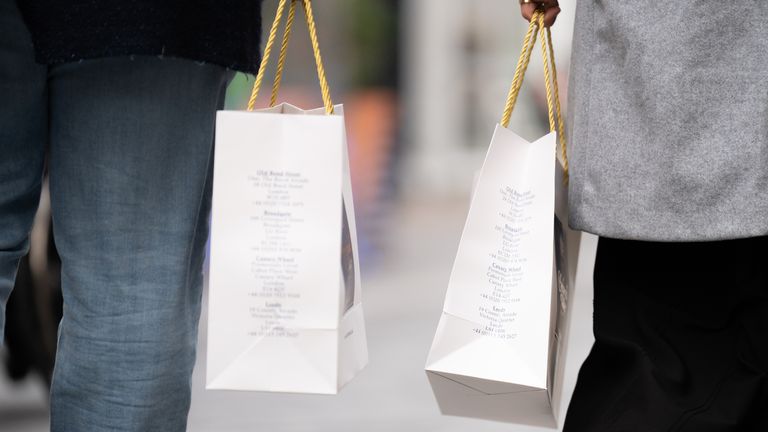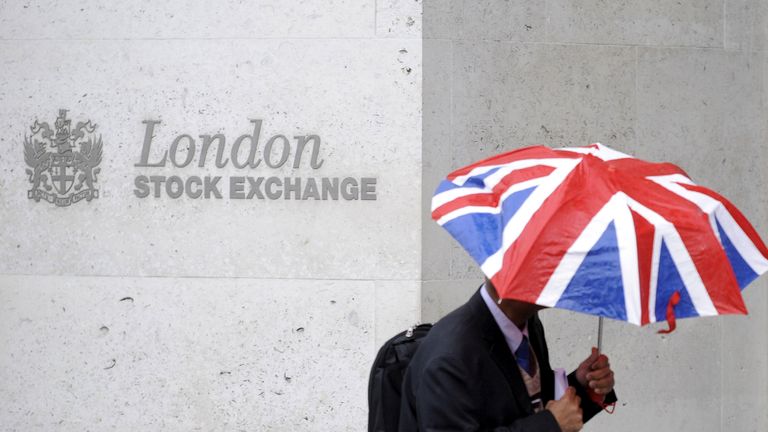Encouraging high street numbers should be kept in perspective | Ian King
There are suggestions that commentators overdid the pessimism in the run-up to Christmas, though the outlook is bleak.
Thursday 12 January 2023 09:14, UK
A couple of swallows do not make a summer.
That is the very heavy caveat which must be applied when asking whether, because Next and B&M fared better than expected over Christmas, the retail sector as a whole has done.
A further caveat to be applied is that Lord Wolfson, the chief executive of Next, is a past master at managing market expectations.
The longest-serving chief executive of a FTSE-100 company, he has downplayed his hopes for festive trading during many past Novembers, only to surprise on the upside come January.
Some encouraging signs
That said, the numbers are hugely encouraging, particularly in view of the silence that has been heard elsewhere around the high street.
For more than a decade, retailers have been under increased pressure from the listing authorities to publish any unexpected news around Christmas trading, lest a false market be created.
Accordingly, were there to be bad news out there, one would have expected one or two unscheduled trading statements by now.
The London Stock Exchange is now into its third day of trading in 2023 and, as yet, there have been no profit warnings.
Overdoing the pessimism?
That plays into the idea that a lot of media and City commentators were overdoing the pessimism going into Christmas.
As Simon French, the chief economist and head of research at the investment bank Panmure Gordon, noted this morning: "First few UK festive trading updates (Next, B&M, Greggs) painting a picture that doesn't fit narrative of doom and gloom. In our 2023 outlook we noted regressive nature of staples inflation would generate some incredibly difficult hardships - but may not be reflected at macro level.
"Very early days - and entirely possible a new year hangover kicks in - but strong aggregate household balance sheets, behavioural adaptations and high [job] vacancy rates have been drowned out amidst distributional/political angst at type of economic outcomes being generated."
In other words, households are far from done with running down the savings enforced on them during the COVID lockdowns.
Mr French points out that household savings remain £135bn higher than they were during the pre-COVID era. Clearly, not every household will have that cushion of savings, but the chances are that the solidly middle class market served by Next will do.
Raising wages outpace by inflation in some areas
It is also worth bearing in mind that, for those in work, wages are rising at levels not seen for a decade if not longer. Not enough to keep up with the headline rate of inflation, of course, but certainly in some categories they are.
According to the Office for National Statistics, regular pay - which strips out bonuses - rose by 6.1% from August to October last year, the latest period for which figures are available.
Anecdotal evidence suggests wages have continued to grow at least at that rate since.
Meanwhile, figures released yesterday by the British Retail Consortium on Wednesday suggest that non-food inflation slowed from 4.8% in November to 4.4% in December, so clearly wages are more than keeping up with inflation in some areas.
That may help explain the strong performances from both Next and B&M and, to a lesser extent, what appear at face value to be surprisingly decent figures published this afternoon from the US-listed Boots.
In the case of Next, the company has also benefited from the weather, as Lord Wolfson observed in today's trading update: "We believe that the strength of demand for cold weather products in December was partly a result of pent-up demand from an unusually warm October and November."
Supermarket performance will be a key indicator
The big question for sector-watchers this year, in view of the galloping level of food price inflation, is how the food retailers and, in particular, the supermarkets, have performed.
One of the very best in the business, Clive Black at Shore Capital, believes that here, too, the doom and gloom may have been overdone.
He told clients on Tuesday: "Against the backdrop of two years of families and friends not seeing each other, despite the best efforts of the railway unions, we sense that British folks ate a lot and drank bucket loads over the Christmas 2022 season.
"We feel that the UK supermarkets largely sold through well, albeit how gross margins (19p pre-Christmas vegetables) and operating costs panned out remains to be seen.
"From our store visits we see quite clean exits; we'll learn more next week with multiple trading updates from the likes of J. Sainsbury, Marks & Spencer and Tesco."
Mr Black noted that, with the hospitality sector hit severely by the rail strikes in the run-up to Christmas, the supermarkets will have gained "share of calories" over the festive season as consumers who would otherwise have gone to Christmas parties spent money with them instead.
He went on: "Whilst we sense that Christmas 2022 may not have been one for the raising of bunting, it was not the multiple car crash that some feared."
Bleak outlook remains
That is not to say things are still looking pretty bleak for the first half of this year.
Consumer sentiment will continue to be depressed and, in many cases, disposable household incomes will fall. An estimated two million UK households will see their mortgage payments increase significantly this year as their existing fixed rate deals expire.
Inflation, while likely to fall towards the middle of the year, is yet to peak in some categories.
Lord Wolfson suggested today that Next's cost price inflation on like-for-like goods was likely to peak at around 8% in the spring-summer season. There is also likely to be a tick-up in unemployment, albeit from what remains, remarkably, a 48-year low.
And Christmas, being such an important time of the year for millions of us, can often be misleading in terms of what it says about the wider economy.
Lord King, the former governor of the Bank of England, warned 18 years ago about the danger of reading too much into one month's retail sales figures with these memorable words: "The true message of the Christmas story will not be revealed until Easter. Or possibly much later."
So yes, the numbers published today have been encouraging, but need to be kept in perspective.






